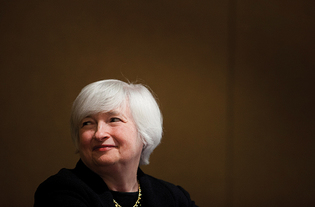
Sam Hodgson/Bloomberg via Getty Images
Janet Yellen
Economist
By James Ledbetter ’86
Janet Yellen’s place in history was secured in January 2014, when the Senate voted to confirm her as the first—and to date, only—female chair of the US Federal Reserve in the bank’s century-plus existence. The fact that she is the lone woman to occupy this august position is nothing new for Yellen. When she received her doctorate from Yale in 1971, she was the only woman that year to get a Yale PhD in economics.
Yet, while acknowledging that economics was and is dominated by men, Yellen says that her gender even 50 years ago presented no major obstacles to her work at Yale. True, there were no senior women in the economics department. But Yale had started admitting women as undergraduates in 1969 and, Yellen noted in an email interview with the Yale Alumni Magazine, “it was the height of the women’s movement and opportunities were improving.”
She particularly recalled the support she got from James Tobin and Joseph Stiglitz, who supervised her thesis. Tobin was a dominant figure in the Yale economics department; his version of Keynesian economics attracted a number of economists who wanted to use macroeconomic tools to stimulate growth and create jobs.
Yellen was no exception. She had grown up in Brooklyn when the pain of the Great Depression was still a fresh memory.
At Yale, Yellen was Tobin’s teaching assistant, and she handed her notes out to the economics graduate students. These notes were so useful that they remained in circulation for decades; “I met people in later life who told me how much they appreciated them,” says Yellen.
Stiglitz recalls her as “a wonderful student.” Yellen, he said, fit in with the department’s “ethos of concern about macrostability,” again invoking the Great Depression as something this ’60s/’70s generation of emerging economists wanted to prevent. Another economics professor, Arthur Okun, was in the Johnson Administration and there were lots of discussions about using government power toward social goals.
For many of Tobin’s acolytes, the idea of using monetary policy as a tool to stimulate the economy was largely a topic for academic discussion. For Yellen, it became her job. The work she did with Ben Bernanke to respond to the financial meltdown of 2008, she says, was one of her proudest achievements. And unwinding the Fed’s intervention was equally important; Yellen as Fed chair wanted “to show that this could be done smoothly and uneventfully so that the public and policymakers would see that these unconventional tools could safely be deployed again.”
Yellen supports the Fed’s recent major decision to downplay its historic inflation target of 2 percent. She calls it “an important change and necessary in the current environment where interest rates have been very low and are expected to remain low, even after we recover from the pandemic.” It’s a logical continuation of efforts her Fed made to explore new monetary tools in an era when its normal “big stick” of interest rates remained near zero.
Yellen says she understands that many women still feel there are gender barriers to entering the field of economics, and “unfortunately, these feelings are well-founded.” Nonetheless, she labels it a “wonderful field of study—richly rewarding and filled with satisfying career options in academia, government, and in business.”
 loading
loading